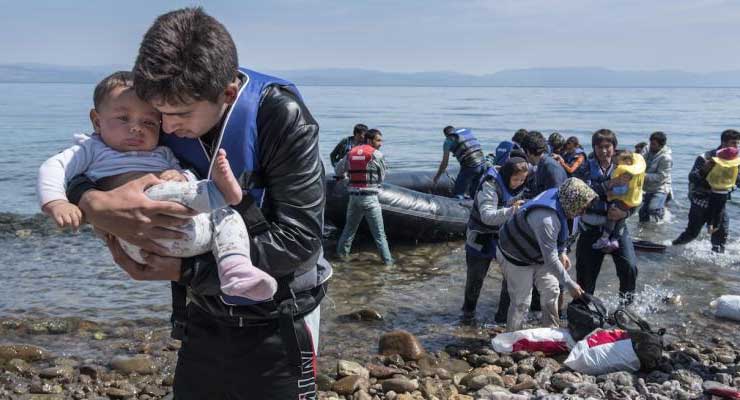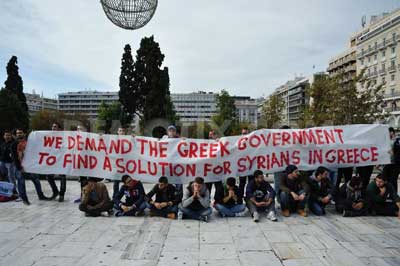
We are in an age of unparalleled relocation of people, mostly fleeing their country because of intolerable internal political/religious conflicts. In the Middle East, refugees risk death escaping the constant threat of destruction, braving perilous journeys over land and sea seeking haven in neighboring/nearby countries. While those who do escape still face difficult days ahead on their way to destination countries, haven countries also face difficult times grappling with this unequaled influx of desperate humanity. Some countries now face their own crisis under the strain of the seemingly unending daily arrival of thousands of refugees. Greece, in particular, burdened by an ongoing devastating economic crisis and ill-equipped to absorb the onslaught of refugees, is seriously affected on many fronts by this migration.
Especially in Greece, refugees find citizens who have, because of their economic depression, their own reasons to feel hopeless and exhausted, and risk growing weary of the burden of the crisis. Greece is economically insecure under current austerity measures and high unemployment rates. In contrast, destination countries such as Austria, Germany, and Sweden, are economically intact, with low unemployment. The sensitivity of European Union (EU) governments to public insecurity over the incitement of unemployment and economic hardship because of the needy refugees, weighs heavily on ongoing negotiations to find a unified and equitable solution.
The Greek Reaction to a Refugee Crisis
Despite their marginal economic status, Greeks felt a stronger willingness to help entering Syrians at the outset of the refugee crisis because of their history with Syria. In the 1920s, after the Asia Minor catastrophe, thousands of Greeks in Anatolia sought refuge in Syria. Early on, Syria supported them with food and other staples garnered from various charities. However, within several months, rations depleted and Syria could no longer physically or economically handle the influx of refugees. Presently, the tables “have turned,” and Greece—although willing in principle—finds it increasingly difficult to manage the onslaught of Syrian refugees as resources are strained.
 Astonishingly, only two fully-equipped refugee first-reception centers exist in Greece, on the islands of Lesbos and Samos. There, refugees encounter costly cumbersome processing procedures conducted against the backdrop of the security threat posed by their high numbers. Refugees must have their passports scanned and need to be fingerprinted.
Astonishingly, only two fully-equipped refugee first-reception centers exist in Greece, on the islands of Lesbos and Samos. There, refugees encounter costly cumbersome processing procedures conducted against the backdrop of the security threat posed by their high numbers. Refugees must have their passports scanned and need to be fingerprinted.
The backlog is high, and lingering crowds develop. They are provided some food and little shelter. Basic health assistance is available, but services are understaffed and restricted to medical emergencies. Appropriate staffing for all humanitarian services is lacking, forcing the local police to fill in. Police claim to work not only as police, but as doctors, social workers, and even psychologists.
However, there are a few reports countering the police’s accounts of their involvement in the refugee situation. Amnesty International, a humanitarian non-governmental organization (NGO), and Frontex, a border control agency working for the EU, recount instances of police pushing back and abusing refugees. Despite Frontex’s acknowledgement that the Syrians fleeing war and armed conflicts are refugees—thus lawfully eligible for protection and asylum in Europe—the patrol deems their entry into the EU an “illegal border crossing,” and arrests refugees in many cases.
The People Helping to Defuse Refugee Crisis
Local activists try to help. Residents—despite the serious disruption in their usual daily life—step in to provide newly-arrived refugees with food, clothes, and medical attention, trying to fill in the gaps of Greece’s struggling asylum system. Food is often distributed by locals and NGOs with little coordination by Greek authorities. Sympathetic tourists also unexpectedly find themselves offering assistance. However, with some 500,000 refugees crossing into Greece’s borders so far—50,000 since November 1st—Europe’s stalled assistance with this humanitarian emergency occurring in a struggling member nation is obvious.
It has forced Greece to single-handedly cope with the crisis. Overwhelmed, Greece just activated the EU Civil Protection Mechanism for emergency material and border guard support, reserved for member states when they feel overcome by a crisis. Europe has supported Greece with some financial aid, but Greece has already spent 1.5 billion euros of its own. But financial aid is not enough. Other resources, such as border guard support at its Aegean Island shores, transport buses, manpower, and equipment for the reception/registration centers are essential to allow refugees to be identified, registered, and their status assessed upon arrival. Additionally, local shelters need to be constructed and available medical services augmented.
Not all Greek locals have been willing to lend a hand, fearing a negative impact on local tourism if needy arrivals continue to increasingly collect. Tourism has been about the only viable industry in Greece during its financial crisis. While see some altruistic tourists sacrifice vacations to volunteer, there are disgruntled others who prematurely leave the island. There is fear future visitors may not come at all. On the island of Kos, where tourism accounts for 70% of its economic revenue, a 7.3% decline in the number of tourists occurred during the first seven months of 2015, which local businesses blame on the refugee influx. The lack of efficient refugee reception facilities forces backlogged arrivals to sleep and wash outdoors in open-aired public spaces, creating unsightly images for many vacationers.
The receiving Greek islands face a huge sanitation problem. On many islands, hotel owners decry the lack of sanitation among refugees in public spaces. Locals and tourists alike commonly complain about copious garbage left behind by refugees that is difficult to manage on a daily basis. Refugees camping outside near Lesbos’ major port lack access to lavatories, thus, human waste is contaminating water and food supplies. Many Greeks take extreme cumbersome precautions, strictly observing hygiene rules before consuming any food and water.
As resources, and patience, run thin, anti-refugee sentiment is strengthening within the minds of many local residents and business owners, and those of the Greek police and Frontex. As this sentiment is heard across Greece, the strain of the financial crisis increasingly fuels it, giving traction to a burgeoning perverted perception of social justice propagated by one political party, Golden Dawn. This political party is extreme right, often described as Neo-Nazi. The party gained popularity in Greece because of its strong anti-refugee stance.
In the September Parliamentary elections, the party’s number of voters increased significantly among the 12 Aegean islands hardest hit by refugee arrivals. There, the party’s percentage went up to 8.1% from 5.5%. The greatest increase was on the island of Symi, where the percentage went from 6.5% to 10.7%. Golden Dawn capitalized on the refugee crisis, advancing its agenda by posting television commercials to promote its xenophobic propaganda. Members of the current main opposition party in the Greek Parliament, the conservative New Democracy Party, now view supporters of Golden Dawn as a legitimate pool of voters, and have lately uncharacteristically promoted a xenophobic attitude in an attempt to capture them.
While the ongoing Greek financial crisis recently challenged the political/economic wholeness of Europe’s union, the refugee crisis adds a new threat to that union. The two critically important issues that a unified Europe needs to solve are a viable plan for the vigilant ongoing processing of the refugees and equitable sharing of the refugee relocation burden and a blueprint for the rational eventual integration of the refugees into European society. Also, dealing with the root causes of the migration wouldn’t hurt either.
Links to sources:
- https://greece.greekreporter.com/2015/09/29/there-was-a-time-greeks-sought-refuge-in-syria
- https://www.amnesty.org/en/latest/news/2015/06/greece-humanitarian-crisis-mounts-as-refugee-support-system-pushed-to-breaking-point
- https://europa.eu/rapid/press-release_IP-15-6249_en.htm
- https://www.nytimes.com/2015/10/31/world/europe/tsipras-migrants-aegean-eu.html
- https://news.yahoo.com/fights-among-migrants-break-greek-island-kos-082856334.html
- https://www.theguardian.com/commentisfree/2015/sep/21/eu-refugee-crisis-golden-dawn-greek-neo-nazi-europe
Leave a Reply